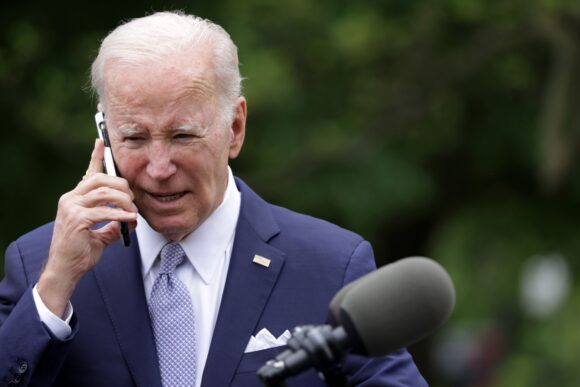- Home
- About
- Insurance
- Quote
- Dental/Health
- Service
- Notary
- News
- Referral Partners
- Agent Resources
Creators of Biden Audio Deepfake Face Potential Charges *Centurion Insurance AFS*

[ad_1]

An AI-generated cloned audio message of President Joe Biden that attempted to dissuade registered Democrats from voting in the New Hampshire primary election was traced to a Texas company and its owner.
Attorney General John Formella said on Tuesday the audio deepfake was tracked back to Life Corporation, a Texas company owned by Walter Monk, who also owns companies which provide political robocall and phone polling services. The deepfake sounded like Biden — it even used a favorite catchphrase, “What a bunch of malarkey” — and urged New Hampshire voters not to cast their ballots in the state’s Jan. 23 primary election.
The people responsible for the fake audio could face criminal and civil charges, Formella said, citing laws that prohibit voter suppression and displaying inaccurate caller ID with the intent to cause harm. He described the episode as a real-life example of using AI in an attempt to interfere with an election.
“AI-generated recordings used to deceive voters have the potential to have devastating effects on the democratic election process,” he said in a statement.
Formella didn’t say who created the audio deepfake. His office is continuing to investigate whether Life Corporation worked with or at the direction of any other persons or entities.
AI Election Fears
Monk didn’t immediately respond to an email message seeking comment. Monk is also the owner of PollMakers, a company that creates over-the-phone surveys for political campaigns, and Voice Broadcasting, which creates “a powerfully persuasive set of prerecorded phone messages for customers” and then uses “advanced technology to deliver these compelling messages to a targeted list of your prospects,” according to his LinkedIn profile and company websites.
The fake robocall of Biden alarmed disinformation experts and elections officials alike as US authorities grapple with how best to stave off the potential for AI-enabled electoral interference ahead of November’s presidential vote.
The call circulated over the weekend prior to the primary election. “Your vote makes a difference in November, not this Tuesday,” the phone message said. In reality, the president wasn’t on the ballot in the New Hampshire race and voting in the primary didn’t preclude people from participating in November’s election. The deepfake didn’t dampen turnout from Democrats, who showed up in droves to give Biden a big victory as a write-in candidate.
New Hampshire authorities traced a select group of calls with the help of the Industry Traceback Group, which works to find the origin of illegal robocalls, back to the source, Formella said. The calls went to mostly registered Democrats and was spoofed to appear to come from a former New Hampshire Democratic Party chair, officials said.
A call monitoring service, Nomorobo, estimates between 5,000 and 25,000 calls were made, according to Formella.
Cease and Desist
Formella urged greater education about the risks of AI-based election interference and said New Hampshire authorities are working with the Federal Communications Commission among others on its investigation.
The FCC’s Enforcement Bureau issued a cease-and-desist letter against Texas-based Lingo Telecom, which authorities said was the service provider for the calls and which has now suspended services to Life Corporation, according to Formella. Lingo’s Chief Compliance Officer Alex Valencia said that the company “immediately” conducted an investigation into the calls after receiving an inquiry from authorities.
“On the same day we were contacted by the Task Force, we quickly identified and suspended the involved account, and will continue to cooperate with federal and state investigators to bring a resolution to this matter,” Valencia said in a statement.
“Consumers deserve to know that the person on the other end of the line is exactly who they claim to be. That’s why we’re working closely with state attorneys general across the country to combat the use of voice-cloning technology in robocalls being used to misinform voters and target unwitting victims of fraud,” FCC Chairwoman Jessica Rosenworcel said in a statement. After the deepfake episode in New Hampshire, Rosenworcel called to make AI voice-generated cloned robocalls illegal.
Lingo was provided with supporting data for the calls and identified Life Corporation as the party that initiated them, according to the FCC. New Hampshire has issued document preservation notices and subpoenas for records to Life Corporation and to multiple other entities, including Lingo Telecom, according to officials there.
In a related action, the North Carolina Department of Justice, which co-leads the 51-member Anti-Robocall Multistate Litigation Task Force, said in a Feb. 6 letter addressed to senior officers at Life Corporation that some of the 20,000 illegally spoofed calls it reviewed were consistent with a Telephony Denial of Service. That’s an intentional attack on the voice service communications system of an organization intended to disrupt service by flooding the network with multiple and malicious inbound calls.
It isn’t the first time Lingo and Life were the subjects of an illegal robocall investigation, according to the FCC. Since 2021, the Industry Traceback Group has identified Lingo as the gateway provider responsible for 61 suspected illegal calls originating overseas that entered the US. In 2003, the FCC issued Life a citation for delivering apparently illegal prerecorded and unsolicited advertisements to residential lines.
The FCC received close to 30,000 complaints in the first 11 months of the year about misleading or inaccurate caller identification information, down from a high of nearly 71,000 in 2019, according to a December 2023 annual report to Congress on robocalls. The report highlighted what it said was a new concerning trend in the evolution of illegal robocallers including voice phishing attacks “that use AI-powered robocalls that mimic a real conversation.”
Monk’s Voice Broadcasting says it has phone numbers of “every single business entity” in the country, according to its website. A customer service representative at Voice Broadcasting told Bloomberg News that they were aware of the Biden deepfake call and its link to the company but declined to answer further questions.
PollMakers says it is able to send 3,000 calls per minute, at 2-7¢ per call or 30-70¢ for every completed survey, according to its website. Examples of survey questions, provided on the website, include: “Is global warming a reality or a hoax?” “What do you think of Donald Trump’s performance?” and “What do you think of the bathroom bill?”
Photo: Joe Biden, Photographer: Alex Wong/Getty Images
Copyright 2024 Bloomberg.
Topics
Texas
New Hampshire
[ad_2]
Source link







Comment (0)